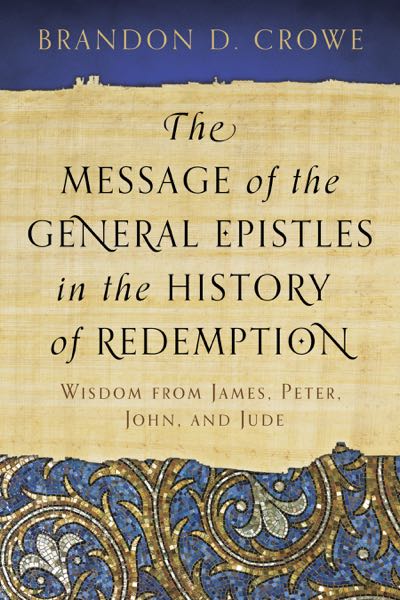
Brandon D. Crowe
Reviewed by: George C. Hammond
The Message of the General Epistles in the History of Redemption: Wisdom from James, Peter, John, and Jude, by Brandon D. Crowe. P&R, 2015. Paperback, 232 pages, list price $16.99. Reviewed by OP pastor George C. Hammond.
“Do you understand what you are reading?” “How can I, unless someone guides me?” So went the exchange between Philip and the Ethiopian official in Acts 8.
The letters of James, Peter, John, and Jude are brief enough to be easily read in one sitting, but they are often avoided because they contain things that are “hard to understand” (to turn Peter’s ironic statement regarding Paul’s writings back upon him!). What can it mean when James says, “You see that a person is justified by works and not by faith alone” (2:24); when Peter says, “Baptism … now saves you” (1 Peter 3:21); when John says, “No one born of God sins” (1 John 3:9); and when Jude cites extracanonical writings (v. 9)?
Brandon Crowe’s nontechnical and readable book employs four methods of study: topical, exegetical, redemptive-historical, and systematic. It is divided topically by chapter into four sections (“Scallywags,” “Scoffers,” “Schisms,” and “Wisdom”), each dealing with themes within these letters. Although these themes track more or less with specific letters, Crowe’s treatment has some “cross-pollination” from the other letters in each section, and thus these epistles are treated as a corpus.
Crowe briefly introduces each letter, explaining its historical and cultural milieu, knowledge of which is indispensable for sound exegesis. Crowe also sets the epistles in their redemptive-historical context. He uses a Luke 24–inspired hermeneutic to expand upon how the letters’ citations of the Old Testament bear witness to Christ.
This is capped off by a systematic treatment of the topics that are raised in each of the letters, such as election, justification and sanctification, baptism, and eschatology. If evangelism is “what man is to believe concerning God,” and discipleship is “what duty God requires of man,” these epistles (and thus this book) are focused on discipleship.
Benefiting from this book will be anyone who has stayed away from these letters because of their difficulty. The book would be particularly beneficial to those without formal theological training who are called upon to teach one of these epistles.
Although Crowe focuses on the individual letters in turn, each one is referenced throughout the book, so that the reader’s understanding of each letter will be enhanced by reading the book in toto. In an age of snippet information and Internet “research,” which in my experience has done tremendous harm to the faith of the saints, this book begs to be read in its entirety and deserves to be.
June 29, 2025
June 22, 2025
June 15, 2025
June 08, 2025
June 01, 2025
Anxiety: Finding the Better Story
May 25, 2025
April 27, 2025
The Devoted Mind: Seeking God’s Face in a World of Distraction
© 2025 The Orthodox Presbyterian Church